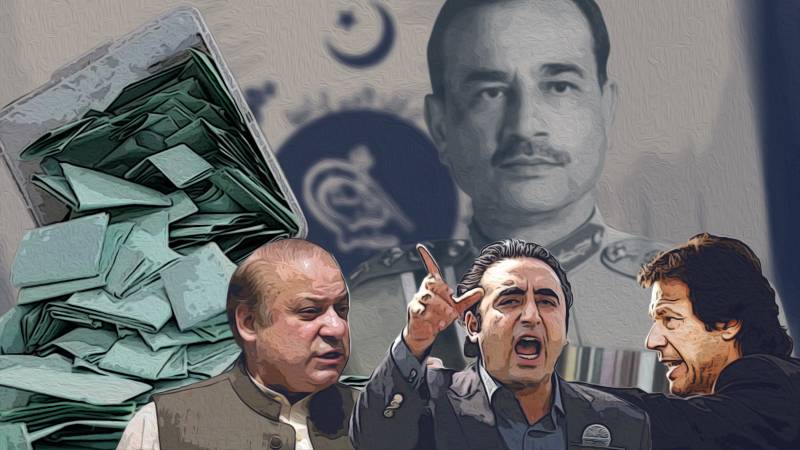
The farcical elections, instead of showing a path to stability, have plunged Pakistan into a deeper crisis. Widespread allegations of vote rigging have rendered the entire exercise dubious. The new coalition government led by Pakistan Muslim League-Nawaz (PMLN-) and supported by the Pakistan People’s Party (PPP) will be haunted by a deepening economic crisis and issues of legitimacy.
The real winner of this election, i.e., Pakistan Tehreek-e-Insaaf (PTI) claims that it has been robbed of its mandate - a clear and substantial majority in the centre and Punjab province. PTI candidates, contesting as independents sans their electoral symbol, in addition to numerous coercive, administrative, and legal measures, have emerged as the single largest parliamentary group. This by itself was a major shock for the miltablishment, and its current allies the PML-N and the PPP. The PMLN was exposed as a party of the past stuck in a time warp and the latter, despite vote gains, was unable to make headway in the Punjab. Election 2024 is a clear win for PTI and is going to bolster its fortunes in the coming years.
In addition to the 90-plus PTI-backed independents who won the elections, reports suggest that the tally would have been higher if late night interventions were not made. PTI maintains that seats in Islamabad, Karachi, Lahore, and other parts of the country were manipulated in the early hours of February 9. The Election Commission of Pakistan and the judiciary would ultimately adjudicate on the veracity of these claims, but it won’t be any time soon.
PTI voters displayed immense passion and resilience and were largely peaceful in casting their protest vote. The ridiculous cases against Imran Khan, especially the infamous Iddah verdict, contributed to the public anger. It was not just anger, but the strategic use of technology that enabled the party to mobilise its voters amid draconian restrictions on its candidates, public gatherings and campaigning. The PML-N has faced a near-rout in its strongholds, such as Lahore, Gujranwala, and Faisalabad in the Punjab province.
The prevalent impression that the PML-N was the miltablishment’s choice did not go down well with the electorate. It also led to a complacency among its candidates. This election should serve as a warning for the likes of the PML-N and the PPP that the era of dynastic politics is nearing extinction, not unlike India, where the Congress Party is becoming irrelevant, and its comeback seems next to impossible. Parties structured like a family enterprise are not going to attract the restive, increasingly middle-class and urban voters. Short of a complete makeover, the old guard of national politics is becoming irrelevant to the younger population. Granted that the miltablishment played a major role in discrediting the PPP and the PML-N, they also are short of ideas as they encounter an unending wave of populism worsened by the economic downturn, inflation and widening inequities.
The legitimacy deficit will provide an ideal ground for agitational politics, especially when PTI leader Imran Khan gets out of jail. And that day is not too far, given the tectonic shift of February 8
These lessons appear lost on the miltablishment. Right after election day, a public message from the GHQ was clear: the political forces should create a ‘unified’ government. In other words, a coalition of large and small parties minus the PTI. A repeat of the PDM government that ruled the country from April 2022-August 2023. These parties, with due deference, started negotiating, and the bargains for power spoils are clear now. Both the PML-N and the PPP, by not recognising the mandate of the PTI, are discarding one of the cardinal principles of parliamentary democracy: rule by majority and respecting the people’s will. Short-term power interests are at work here, painting a grim future for democratic politics in the country.
Pakistan needs a stable government, accommodation of the popular will and economic reforms that curtail subsidies for the super-rich and the powerful, and transfer resources to human development. The dependence on international finance institutions for financial solvency requires working on austerity measures that reduce the chance of large-scale public welfare and development spending. The incoming government will most likely face public discontent due to inflationary pressures, low growth, and greater unemployment. In addition, the legitimacy deficit will provide an ideal ground for agitational politics, especially when PTI leader Imran Khan gets out of jail. And that day is not too far, given the tectonic shift of February 8. The judges are not immune to public opinion, and will defy executive diktat sooner than later.
The miltablishment may have lost in the short-term, but it has a history of rising like a phoenix. Its ideal arrangement is a weak, pliable civilian government that can protect the military’s hegemony. But the sagging popularity of khakis, especially in their home ground — the Punjab province — will be a cause for concern. This is why there will be a need to recalibrate the institution’s policy towards Imran Khan. The latter has already declared on numerous occasions that he is willing to talk. Now, that time may have arrived, and within a year or sooner, a negotiated settlement cannot be ruled out.
The past year's events are also a testament to the fact that older tactics of repression, coercion and trampling of the popular sentiment don’t work in the digital age. In fact, the encroachments made into the civilian space and policymaking are untenable. The sooner the generals realise this, the better it is for the institution and the country.

